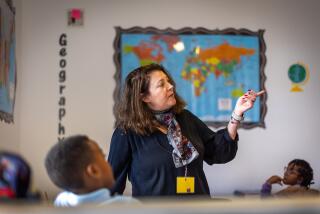A Penny for Their Thoughts : Teen-age teacher accomplishes small academic miracles in her summer school for kids in Compton housing project.
- Share via
Teacher Penny Wilkerson takes a hands-on approach to the ABCs. “Come on, Junior. Make your A’s,” she said, cradling the 4-year-old’s hand in hers. “Go down . . . cross,” she said, guiding his pencil across the page.
“You guys,” Penny said, turning to lecture four older boys on the merits of multiplication, “(if you) know your times tables it makes it easier for you to divide.”
Penny was juggling individual lessons for nine children, ages 4 to 11, in the summer school she runs at Park Village, a housing project in Compton.
At 14, she was the oldest person in the room.
“Multiplication is just a better way of adding,” the teen-age teacher said, urging on the boys who deftly passed their pencils from hand to hand as they worked because only one of the yellow stubs still had any eraser left.
Penny’s classroom is makeshift--just a long, brown work table in a corner of the housing project office. Her supplies are sparse--paper and pencils donated by the housing project management, some work sheets and books scrounged from teachers she knows.
There is nothing makeshift, though, about her standards.
“Anybody that walks in here tomorrow without their homework will not get to participate in the picnic,” she told her students.
“Write your words,” she told a little girl caught daydreaming. “How are you going to learn how to spell them if you won’t write them?” she asked.
“Spit out your gum, Travis,” she said to a 9-year-old.
Travis, who was late for the 8 a.m. class, walked over to a wastebasket and deposited the gum. His sister, Glinda, 8, sat down, plopped her handbag on the small lap made by her pink miniskirt and tackled a math assignment.
A big sister figure to younger children in Park Village, which is home to 164 families, Penny will stride across the grounds of the low-rise housing complex and knock on an apartment door to fetch to class a child who has overslept.
“Where’s Valerie?” Penny asked suddenly, interrupting the silence that hung over the classroom while the children concentrated on their tasks. “Is Valerie coming?”
A little girl at the far end of the table, Mulu Lokein, 6, and always silent except when reciting her spelling words, looked up and nodded in the affirmative.
Penny, a gifted student who wants to be a lawyer, expects as much from her students as she does from herself. When Mulu’s mother was visiting class one day last week and saw the math assigned to her daughter, she thought it too difficult for a 6-year-old.
“She can do it,” Penny said, producing a folder full of similar lessons that Mulu had mastered.
By the end of class, Mulu, who didn’t know how to add and subtract until Penny taught her, had solved every problem on her math work sheet, just as she learned the day before to spell every word on her spelling list.
“Junior, come on, sweetheart,” Penny said, acting quickly to refocus the restless 4-year-old’s attention.
“OK, I’ll tell you what,” she said. “You do a line of A’s for me and I’ll give you a treat.”
Junior never left his chair during the two-hour class.
Penny’s summer school proved popular with so many children that a second class was organized for 10 a.m. and an adult resident was recruited to help teach the older children.
Penny, who has spent most of her life in the project, got the idea for her summer school while listening to her younger sister, Lugenia, 11, and her friends play school. The two sisters live with their grandmother, Ora Gray.
Saw a Need
It seemed to Penny, she said, that the youngsters playing school “didn’t know too much.” So she polled children in the project to see if they wanted a summer school and the response was positive.
“My grandmother says it’s because I want to be a ruler,” the teen-ager answered when asked to explain her motives for teaching.
“She said I like to have people follow me. She says as long as I’m teaching them the right things . . . it’s all right. . . . The older kids around here--they’re, like, gang members and they have the little ones following them and they’re doing wrong things.”
She can’t explain, she said, why the children attend class every day when they could be idling away the summer mornings. Maybe it’s because they sense that Penny understands them.
“You know them by heart? What’s seven times five?” she asked an 11-year-old who until this summer, Penny said, did not know how to multiply.
The math student and his 9-year-old brother attend class regularly. But housing project managers said the brothers were notorious for skipping class during the regular school year, hiding from truant officers who patrol the project.
“I think,” Penny confided after class, “the reason that they didn’t like to go to school is because they didn’t know too much. I mean by him being 11 years old and everybody else in the class knowing their times tables and him not knowing them and everybody else being able to read and him not being able to read, probably depressed him and made him not want to go at all.”
Maybe it’s the sense of accomplishment they get in Penny’s class that makes the children want to be there.
Junior held his paper up to show everybody.
“You did that?” Penny asked. “You finally made your A,” she said to the saucer-eyed youngster, who beamed with pride at the row of A’s he made, all of them upside down.
Penny gave Junior two pieces of candy. He popped one into his mouth. Clutching the second piece in his fist like a trophy, he raised it in the air, slowly pumping his arm as any champion would.






